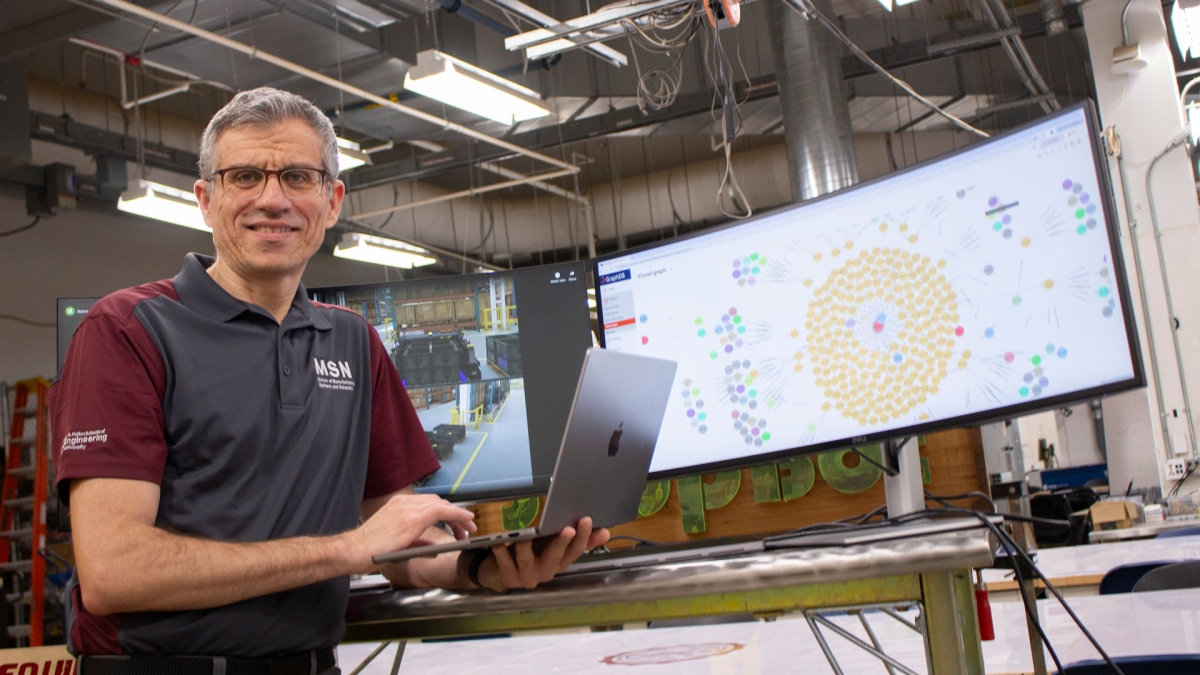AI to connect small and medium manufacturing companies with larger clientele

Farhad Ameri, an associate professor in the School of Manufacturing Systems and Networks, conducts research for his Prototype Open Knowledge Network project, Proto-OKN. Photo by Aisha Kaddi/ASU
Editor's note: This article was adapted from one originally published on Full Circle, the news publication for ASU's Ira A. Fulton Schools of Engineering. To read the full-length article, click here.
In the United States, small and medium-sized manufacturers, or SMMs, form the backbone of the manufacturing industry. But they often struggle with sustaining operations due to limited client visibility and incomplete datasets.
Consider this real-world example: During the COVID-19 pandemic, a lack of reliable data about manufacturers’ capabilities made it challenging to identify those that were capable of producing ventilators at a large scale. Had there been a robust dataset clients could access, they could have quickly connected with companies that had the necessary capabilities to meet urgent health care demands and potentially save lives.
To address these kinds of manufacturing challenges, Farhad Ameri, an associate professor in the School of Manufacturing Systems and Networks, part of the Ira A. Fulton Schools of Engineering at Arizona State University, is spearheading a research initiative aimed at empowering SMMs through artificial intelligence, or AI, in conjunction with data-driven solutions.
“In simple terms, our goal is to enrich data,” Ameri says. “If we have high-quality data, then software agents and AI-powered tools can better understand and interpret the data to make more informed decisions.”
The work is a part of a larger initiative funded by the National Science Foundation, or NSF, called the Prototype Open Knowledge Network, or Proto-OKN. The NSF has invested $26.7 million into a broader project, which aims to build a publicly accessible, interconnected set of data repositories and knowledge graphs to enable data-driven, AI-based solutions for a wide array of societal and economic challenges.
Within the broader project, Ameri is leading the development of the Supply and Demand Open Knowledge Network, or SUDOKN, a specialized network designed to enhance the visibility and resilience of SMMs.
Ameri and his team are developing a set of reusable manufacturing ontologies, or the language used to describe a system, and deploying tools and methods for data collection, validation, harmonization and ingestion. These efforts will then serve as a resource for supply chain managers and other stakeholders.
“Let’s say you want to find an aerospace industry manufacturer based in Arizona who is an expert in micro-machining of aerospace-grade material,” Ameri says. “While that may seem like a simple task, it’s often too difficult to locate.”
One of the challenges SMMs face is the lack of visibility into their operations and capabilities. The SUDOKN project aims to overcome this inconvenience by providing a publicly accessible, standardized dataset that makes it easier to find and assess manufacturing capabilities.
By developing the AI capabilities of this new system, Ameri’s team will be able to process vast amounts of data and provide real-time insights into the strengths and weaknesses of manufacturing companies.
The use of knowledge graphs, a key component of the project, allows for a more intuitive and accurate representation of data at a semantic level. They enable a more dynamic and interconnected understanding of manufacturing capabilities.
The success of SUDOKN will not only benefit manufacturers, but also serve as a model for other sectors. As Ameri and his team continue to develop and refine the network, they will collaborate with other Proto-OKN projects and institutions such as Purdue University and the Georgia Institute of Technology, sharing insights and best practices.
The ultimate goal is to create a system that is intuitive enough for manufacturers with no prior understanding of ontologies — a structured framework for organizing information and categorizing data — and knowledge graphs to navigate and use effectively.
By the end of the three-year project, Ameri and his team aim to have a fully functional AI-powered system that not only enhances the visibility and resilience of SMMs but also serves as a first-line resource for supply chain managers, policymakers and other stakeholders.
“The National Science Foundation remains closely engaged with my team and this project,” Ameri says. “We are all excited to see the outcome and its impact on the manufacturing space.”
More Science and technology

Turning up the light: Plants, semiconductors and fuel production
What can plants and semiconductors teach us about fuel production?ASU's Gary Moore hopes to find out.With the aim of learning how to create viable alternatives to fossil-based fuels, Moore — an…

ASU technical innovation enables more reliable and less expensive electricity
Growing demand for electricity is pushing the energy sector to innovate faster and deploy more resources to keep the lights on and costs low. Clean energy is being pursued with greater fervor,…

What do a spacecraft, a skeleton and an asteroid have in common? This ASU professor
NASA’s Lucy spacecraft will probe an asteroid as it flys by it on Sunday — one with a connection to the mission name.The asteroid is named Donaldjohanson, after Donald Johanson, who founded Arizona…

